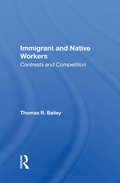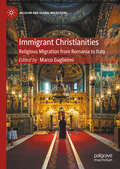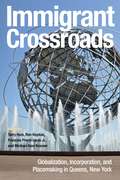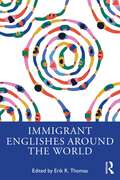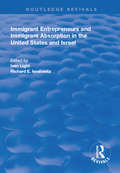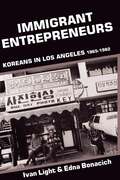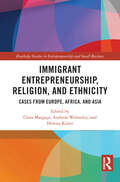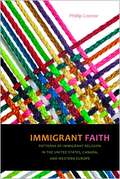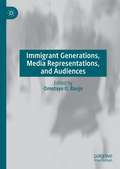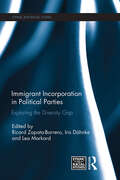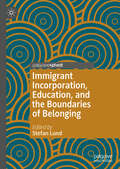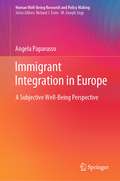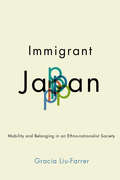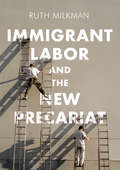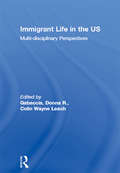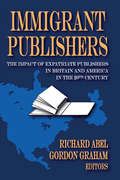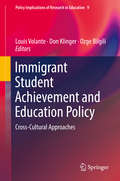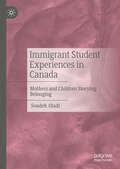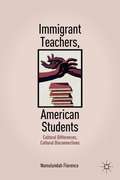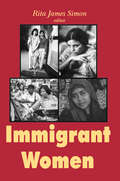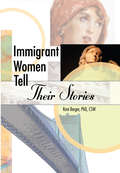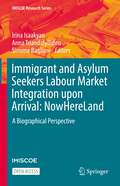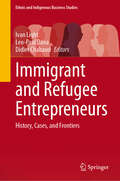- Table View
- List View
Immigrant And Native Workers: Contrasts And Competition
by Thomas R BaileyOriginally published in 1987, this book presents a novel approach to the study of competition between immigrant groups and native minorities (teenagers, women, and black men) in low-wage labor markets.
Immigrant Christianities: Religious Migration from Romania to Italy (Religion and Global Migrations)
by Marco GuglielmiOver the past two decades, Romanian immigration to the Italian Peninsula has grown to nearly a quarter of the country&’s foreign population, making it the largest Romanian diaspora in the world. This volume is the first to examine the religious dimension of this vast migratory phenomenon from multiple perspectives, including sociology, anthropology, ethnology, history, and theology.The chapters study the patterns and transformations of Romanian Churches and Christian movements in Italy, with particular attention to the Romanian Orthodox Church, the Romanian Roman Catholic Church, the Romanian Greek-Catholic Church, and the Romanian Pentecostal Church. They also analyze how these immigrant Churches and religious movements engage with Italian society and respond to contemporary challenges.Drawing on the study of the Romanian diaspora and grounded in a multidisciplinary perspective, this volume develops the notion of immigrant Christianities. The latter provides a heuristic framework for highlighting the growing entanglements and transformative dynamics shaping the multiplicity of immigrant Churches and Christian movements in the contemporary world.
Immigrant Crossroads: Globalization, Incorporation, and Placemaking in Queens, New York
by Tarry Hum, Ron Hayduk, Francois Pierre-Louis, and Michael Alan KrasnerNearly half the 2.3 million residents of Queens, New York are foreign-born. Immigrants in Queens hail from more than 120 countries and speak more than 135 languages. As an epicenter of immigrant diversity, Queens is an urban gateway that exemplifies opportunities and challenges in shaping a multi-racial democracy. The editors and contributors to Immigrant Crossroads examine the social, spatial, economic, and political dynamics that stem from this fast-growing urbanization. The interdisciplinary chapters examine residential patterns and neighborhood identities, immigrant incorporation and mobilizations, and community building and activism. Essays combine qualitative and quantitative research methods to address globalization and the unprecedented racial and ethnic diversity as a result of international migration. Chapters on incorporation focus on immigrant participation and representation in electoral politics, and advocacy for immigrant inclusion in urban governance and service provision. A section of Immigrant Crossroads concerns placemaking, focusing on the production of neighborhood spaces and identities as well as immigrant activism and community development and control. Based on engaged and robust analysis, Immigrant Crossroads highlights the dynamics of this urban gateway.
Immigrant Crossroads: Globalization, Incorporation, and Placemaking in Queens, New York
by Tarry Hum, Ron Hayduk, Francois Pierre-Louis, and Michael Alan KrasnerNearly half the 2.3 million residents of Queens, New York are foreign-born. Immigrants in Queens hail from more than 120 countries and speak more than 135 languages. As an epicenter of immigrant diversity, Queens is an urban gateway that exemplifies opportunities and challenges in shaping a multi-racial democracy. The editors and contributors to Immigrant Crossroads examine the social, spatial, economic, and political dynamics that stem from this fast-growing urbanization. The interdisciplinary chapters examine residential patterns and neighborhood identities, immigrant incorporation and mobilizations, and community building and activism. Essays combine qualitative and quantitative research methods to address globalization and the unprecedented racial and ethnic diversity as a result of international migration. Chapters on incorporation focus on immigrant participation and representation in electoral politics, and advocacy for immigrant inclusion in urban governance and service provision. A section of Immigrant Crossroads concerns placemaking, focusing on the production of neighborhood spaces and identities as well as immigrant activism and community development and control. Based on engaged and robust analysis, Immigrant Crossroads highlights the dynamics of this urban gateway.
Immigrant Englishes Around the World
by Erik R. ThomasImmigrant Englishes Around the World is a collection that explores the varieties of English that emerge when speakers whose native languages are not English immigrate to an English-speaking country. The book examines the commonalities and diversity of immigrant varieties of English that may be seen from a comparison of groups with different heritage languages in different English-speaking nations around the world.Written by established researchers who all have conducted work with communities of immigrants or their descendants, the chapters explore immigrant Englishes across Great Britain, Australia, South Africa, and North America. Covering the theoretical grounding that unifies immigrant Englishes across the globe and using a model that is designed specifically for immigrant groups, the book focusses on how the communities as a whole develop their own distinctive ways of speaking English.This comprehensive comparison of immigrant dialects across the English-speaking world is essential reading for advanced students and researchers of sociolinguistics, language and migration, and language variation.
Immigrant Entrepreneurs and Immigrants in the United States and Israel (Routledge Revivals)
by Ivan Light Richard E. IsralowitzFirst published in 1997, This book now opens the unduly delayed discussion about how Israel and the USA deal with immigration and how they are transformed by it. Approaching the discussion from the point of view of contemporary immigration research, this book prioritizes the economic processes of immigrant insertion in Israel and the USA, immigrant absorption and assimilation in both countries, policy debates, and women immigrants for extended treatment. Additionally, a photographic section mobilizes the new subject of visual sociology to continue the comparative analysis.
Immigrant Entrepreneurs: Koreans in Los Angeles, 1965-1982
by Ivan Light Edna BonacichA decade in preparation, Immigrant Entrepreneurs offers the most comprehensive case study ever completed of the causes and consequences of immigrant business ownership. Koreans are the most entrepreneurial of America's new immigrants. By the mid-1970s Americans had already become aware that Korean immigrants were opening, buying, and operating numerous business enterprises in major cities. When Koreans flourished in small business, Americans wanted to know how immigrants could find lucrative business opportunities where native-born Americans could not. Somewhat later, when Korean-black conflicts surfaced in a number of cities, Americans also began to fear the implications for intergroup relations of immigrant entrepreneurs who start in the middle rather than at the bottom of the social and economic hierarchy.Nowhere was immigrant enterprise more obvious or impressive than in Los Angeles, the world's largest Korean settlement outside of Korea and America's premier city of small business. Analyzing both the short-run and the long-run causes of Korean entrepreneurship, the authors explain why the Koreans could find, acquire, and operate small business firms more easily than could native-born residents. They also provide a context for distinguishing clashes of culture and clashes of interest which cause black-Korean tensions in cities, and for framing effective policies to minimize the tensions.
Immigrant Entrepreneurship, Religion, and Ethnicity: Cases from Europe, Africa, and Asia (Routledge Studies in Entrepreneurship and Small Business)
by Clara Margaça, Andreas Walmsley, and Helena KnörrInternational migration is a growing phenomenon in the 21st century and is increasingly seen as a high-priority public policy issue by many governments, politicians, and the broader public throughout the world. Its importance to economic prosperity, human development, and safety and security ensures that it will remain a top priority for the foreseeable future.This book highlights the importance of ensuring that we remain focused on the successes of migration as well as the challenges. At the end of the 20th century, more importance was given to immigrant and ethnic minority entrepreneurship due to its positive impact on local economic growth and overall economic development in the hosting nations. In the 21st century, the imperative of the United Nations 2030 agenda involves a deeper understanding of the complex challenges for the achievement of sustainable goals. One of these challenges is to understand how migrant-entrepreneurs may or may not identify with their ethnic community, therefore dissociating themselves from their ethnic group. In this sense, religion and ethnicity are differentiating factors between social groups, and the relationships allow preserving their culture and establishing relationships and integration in the community at all levels. This edited volume brings together impactful contributions that will interest multidisciplinary academic areas and aims to contribute to the enhancement of scientific knowledge on the intersection of entrepreneurship, migration, ethnicity, and religion, a gap in the existing literature that has the potential to provide a deeper understanding of factors that influence migrant populations’ contribution to socio-economic development in their communities.This book will be an invaluable resource to researchers and scholars in the fields of immigration, immigrant entrepreneurship, entrepreneurial culture, and economic development.
Immigrant Exclusion and Insecurity in Africa
by Claire L. AdidaThis book explores the diverse immigrant experiences in urban West Africa, where some groups integrate seamlessly while others face exclusion and violence. It shows, counterintuitively, that cultural similarities between immigrants and their hosts do not help immigrant integration and may, in fact, disrupt it. This book is one of the first to describe and explain in a systematic way immigrant integration in the developing world, where half of all international migrants go. It relies on intensive fieldwork tracking two immigrant groups in three host cities, and draws from in-depth interviews and survey data to paint a picture of the immigrant experience from both immigrant and host perspectives.
Immigrant Faith: Patterns of Immigrant Religion in the United States, Canada, and Western Europe
by Phillip ConnorImmigrant Faith examines trends and patterns relating to religion in the lives of immigrants. The volume moves beyond specific studies of particular faiths in particular immigrant destinations to present the religious lives of immigrants in the United States, Canada, and Europe on a broad scale. Religion is not merely one aspect among many in immigrant lives. Immigrant faith affects daily interactions, shapes the future of immigrants in their destination society, and influences society beyond the immigrants themselves. In other words, to understand immigrants, one must understand their faith. Drawing on census data and other surveys, including data sources from several countries and statistical data from thousands of immigrant interviews, the volume provides a concise overview of immigrant religion. It sheds light on whether religion shapes the choice of destination for migrants, if immigrants are more or less religious after migrating, if religious immigrants have an easier adjustment, or if religious migrants tend to fare better or worse economically thannon-religious migrants.Immigrant Faith covers demographic trends from initial migration to settlement to the transmission of faith to the second generation. It offers the perfect introduction to big picture patterns of immigrant religion for scholars and students, as well as religious leaders and policy makers.
Immigrant Generations, Media Representations, and Audiences
by Omotayo O. BanjoThis anthology examines how immigrants and their US-born children use media to negotiate their American identity and how audiences engage with mediated narratives about the immigrant experience (cultural adjustments, language use, and the like). Where this work diverges from other collections and monographs is the area is its intentional focus on how both first- and second-generation Americans’ complex identities and hybrid cultures interact with mediated narratives in general, alongside the extent to which these narratives reflect their experience. In a three-part structure, the collection examines representations, “zooms in” to explore the reception of these narratives through autoethnographic essays, and concludes in a section of analysis and critique of specific media.
Immigrant Incorporation in Political Parties: Exploring the diversity gap (Ethnic and Racial Studies)
by Ricard Zapata-Barrero Iris Dähnke Lea MarkardThis book seeks to explore the potentialities of strengthening a new field of research within migration and diversity studies, that of immigrant incorporation in political parties. The point of departure of all the contributions to this volume is that there is what we call a ‘diversity gap’ between political parties as public representative organisations and diversity dynamics in democratic societies. Exploring the current strategies of political parties developing first conceptual frameworks, theoretical foundations and empirical hypothesis and approaches, this book examines case studies from four European countries: Germany, Ireland, Portugal and Spain. This book was originally published as a special issue of Ethnic and Racial Studies.
Immigrant Incorporation, Education, and the Boundaries of Belonging
by Stefan LundIn this edited volume, authors analyze how symbolic boundaries of belonging are negotiated and reflected upon by school actors in different educational contexts and how that contributes to a richer understanding of the ways in which "we-ness" acts as a fundamentally structuring force in immigrant incorporation. The analyses draw on cultural sociologist Jeffrey Alexander's work on civil sphere theory, thus grasping both the solidaristic dimensions of incorporation and processes of exclusion. Chapters are guided by two major themes: school choice/ethnic school segregation and religion/faith in schooling. Both of these themes provide rich examples of how immigrant school actors negotiate the symbolic codes that define boundaries of belonging/non-belonging in different communities. This focus will broaden the understanding of how educational practices and formal schooling works in relation to immigrant incorporation into different school cultures, as well as in the Swedish civil sphere.
Immigrant Integration in Europe: A Subjective Well-Being Perspective (Human Well-Being Research and Policy Making)
by Angela PaparussoThis topical book sheds light on immigrants’ subjective well-being by analysing the main factors associated with self-reported life satisfaction among immigrants and natives. It thereby draws upon subjective components of well-being, which are now receiving growing attention in well-being research. It also fills in a gap in migration research, which has not yet focused on the study of immigrants’ well-being. Starting from a broader focus on Europe, the book then looks more closely at Italy. This is a key country in the immigration policy field in Europe, but where the study of immigrants’ integration from a subjective perspective has been rarely addressed so far. The book provides suggestions for constructing and implementing immigration and integration policies by not only taking into account the needs of the host societies, but also the experiences, opinions, requirements and expectations of immigrants. This book is very useful for academic and policy researchers working on immigrant integration issues.
Immigrant Japan: Mobility and Belonging in an Ethno-nationalist Society
by Gracia Liu-FarrerImmigrant Japan? Sounds like a contradiction, but as Gracia Liu-Farrer shows, millions of immigrants make their lives in Japan, dealing with the tensions between belonging and not belonging in this ethno-nationalist country. Why do people want to come to Japan? Where do immigrants with various resources and demographic profiles fit in the economic landscape? How do immigrants narrate belonging in an environment where they are "other" at a time when mobility is increasingly easy and belonging increasingly complex? Gracia Liu-Farrer illuminates the lives of these immigrants by bringing in sociological, geographical, and psychological theories—guiding the reader through life trajectories of migrants of diverse backgrounds while also going so far as to suggest that Japan is already an immigrant country.
Immigrant Labor and the New Precariat (Immigration and Society)
by Ruth MilkmanImmigration has been a contentious issue for decades, but in the twenty-first century it has moved to center stage, propelled by an immigrant threat narrative that blames foreign-born workers, and especially the undocumented, for the collapsing living standards of American workers. According to that narrative, if immigration were summarily curtailed, border security established, and ""illegal aliens"" removed, the American Dream would be restored.In this book, Ruth Milkman demonstrates that immigration is not the cause of economic precarity and growing inequality, as Trump and other promoters of the immigrant threat narrative claim. Rather, the influx of low-wage immigrants since the 1970s was a consequence of concerted employer efforts to weaken labor unions, along with neoliberal policies fostering outsourcing, deregulation, and skyrocketing inequality. These dynamics have remained largely invisible to the public. The justifiable anger of US-born workers whose jobs have been eliminated or degraded has been tragically misdirected, with even some liberal voices recently advocating immigration restriction. This provocative book argues that progressives should instead challenge right-wing populism, redirecting workers' anger toward employers and political elites, demanding upgraded jobs for foreign-born and US-born workers alike, along with public policies to reduce inequality.
Immigrant Life in the US: Multi-disciplinary Perspectives (Routledge Advances in Sociology)
by Donna R. Gabaccia Colin Wayne LeachImmigrant Life in the U.S. brings together scholars from across the disciplines to examine diverse examples of immigration to the paradigmatic 'nation of immigrants'. The volume covers a wide range of time periods, ethnic and national groups, and places of immigration. Contemporary Chinese children brought to the U.S. through adoption, Mexican laborers hired to work in the mid-west in the 1930s, Indian computer programmers hired to work in California, and more, are examined in a series of chapters that show the great diversity of issues facing immigrants in the past and in the present. This book emphasizes the complex tapestry that is the everyday experience of life as an immigrant and turns a critical eye on the place of globalization in the everyday life of immigrants. The contrasts it draws between past and present demonstrate the continued salience of national and ethnic identities while also describing how migrants can live almost simultaneously in two countries. This book will be of essential interest to advanced students and researchers of Sociology, History, Ethnic Studies and American Studies.
Immigrant Publishers: The Impact of Expatriate Publishers in Britain and America in the 20th Century
by Richard Abel and Cordon GrahamIn the first third of the twentieth century, the publishing industry in the United Kingdom and the United States was marked by well-established and comfortable traditions pursued by family-dominated firms. The British trade was the preserve of self-satisfied men entirely certain of their superiority in the world of letters; their counterparts in North America were blissfully unaware of development and trends outside their borders. In this unique historical analysis, Richard Abel and Gordon Graham show how publishing evolved post-World War II to embrace a different, more culturally inclusive, vision.Unfortunately, even among the learned classes, only a handful clearly understood either the nature or the likely consequences of the mounting geopolitical tensions that gripped pre-war Europe. The world was largely caught up in the ill-informed and unexamined but widely held smug and shallow belief that the huge price paid in "the war to end all wars" had purchased perpetual peace, a peace to be maintained by the numerous, post-war high-minded treaties ceremoniously signed thereafter.The history presented here has as its principals a handful of those who fled to the Anglo-Saxon shores in the pre-World War II era. The remainder made their way to Britain and the United States following that war. They brought an entirely new vision of and energetic pursuit of the cultural role of the book and journal in a society, a vision which was quickly adopted and naturalized by a perspicacious band of post-war native-born book people.
Immigrant Student Achievement and Education Policy: Cross-cultural Approaches (Policy Implications Of Research In Education Ser. #9)
by Louis Volante Don Klinger Ozge BilgiliThis book examines immigrant student achievement and education policy across a range of Western nations. It is divided into 3 sections: Part 1 introduces the topic of immigrant student achievement and the performance disadvantage that is consistently reported across a range of international jurisdictions. Part 2 then presents national profiles from scholars in ten countries (England, Germany, Italy, Sweden, Finland, Netherlands, Republic of Ireland, Canada, Australia, and New Zealand). These educational jurisdictions were selected because they represent a range of Western nations engaged in large-scale reform efforts geared towards enhancing their immigrant students’ achievement. Each of the national profiles provides a brief overview of the evolution of the cultural composition of their respective school-aged student population; explains the trajectory of achievement results in non-immigrant and immigrant student groups in relation to both national and international large-scale assessment measures; and discusses the effectiveness of policy responses that have been adopted to close the achievement gap between non-immigrant and immigrant student populations. It also examines the relationships between education policies and immigrant student achievement and discusses how education policies have evolved across various cultural contexts. In conclusion, Part 3 analyzes cross-cultural approaches designed to address the performance disadvantage of immigrant students and proposes future areas of inquiry stemming from the national profiles. The book offers insights into a diverse cross-section of nations and policy approaches to addressing the performance disadvantage.
Immigrant Student Experiences in Canada: Mothers and Children Storying Belonging
by Soudeh OladiThis book centers immigrant children&’s school experiences as recounted and interpreted by their mothers, exposing how racialization, exclusion, and proximity to Whiteness shape their realities in Canadian schools. Drawing from Afro-Caribbean, Ghanaian, Indian, Afghan, and Chinese communities, mothers emerge as critical knowledge holders, sharing their children's stories to disrupt institutional erasure. Part One&’s two chapters reveal how Canadian schools enact symbolic multiculturalism while reinforcing linguistic conformity and Eurocentric norms, reframing identity, belonging, and home through mothers&’ stories. Part Two&’s four chapters present mothers&’ and children&’s experiences capturing subversive resistance, intergenerational tensions, trauma, invisibility, and affirmation. The concluding chapter frames storytelling as epistemic resistance, grounding immigrant families' wisdom as essential to transforming education.
Immigrant Teachers, American Students
by Namulundah FlorenceTeachers, as often as students, articulate frustrations over each other's choices and expectations. A teacher's demand for respect may appear an imposition and abuse of authority to students accustomed to speaking out against perceived injustices. All teachers experience some tentativeness, especially in an unfamiliar environment. Since classroom decisions tend to be immediate, choices reflect learned attitudes and behaviors as much as logical decision-making procedures. Florence explores the cross-cultural complexities of teacher/student interactions, particularly African immigrant teachers. Despite the emotional aggravations, cultural misunderstandings offer forums for a reassessment of views, acknowledgement of differences, and initiative for positive change.
Immigrant Women
by Rita J. SimonThe obstacles to assimilation and treatment of immigrant women are major issues confronting the leading immigrant-receiving nations today-the United States, Canada, and Australia. This volume provides a range of perspectives on the concerns, the sources of problems, how issues might be addressed, and the future of immigrant women. It is based upon a two-part issue of the journal Gender Issues, and contains a new introduction by the editor. The first section focuses on labor force experiences of women who have immigrated to the United States and Australia from Mexico and Latin America, Eastern Europe, Korea, the Philippines, India and other parts of Asia. Nancy Foner assesses the complex and contradictory ways that migration changes women's status. Cynthia Crawford focuses on Mexican and Salvadoran women who have recently moved into janitorial work in Los Angeles. M.D.R. Evans and Tatjiana Lucik analyze labor force participation of immigrants in Australia and family strategies of women migrants from the former Yugoslavia against the experiences of woman migrants from the Mediterranean world and other parts of the Slavic world. Economist Harriet Duleep reviews what is known as the family investment model. Monica Boyd tackles the controversial issue of the leading immigrant-receiving nations' unwillingness to declare gender an explicit ground for persecution and thus for gaining -refugee status. The second section deals with social class and English language acquisition, the obstacles women have had to overcome in gaining refugee status in the United States and Canada, and a comparison of movement patterns between different commentaries in Mexico and the United States on the part of Mexican male and female immigrants. Contributors include Suzanne M. Sinke, Katharine Donato, and Nina Toren. Immigrant Women will be valuable to researchers in women's studies, population demographics, as well as those teaching courses in sociology, history, and immigration. Rita James Simon is university professor in the School of Public Affairs at the Washington College of Law at American University. She is editor of Gender Issues and author of The American Jury, The Insanity Defense: A Critical Assessment of Law and Policy in the Post-Hinckley Era (with David Aaronson), Adoption, Race, and Identity (with Howard Altstein), In the Golden Land: A Century of Russian and Soviet Jewish Immigration, Social Science Data and Supreme Court Decisions (with -Rosemary Erickson), and Abortion: Statutes, Policies, and Public Attitudes the World Over.
Immigrant Women Tell Their Stories
by Roni Berger"I felt like an alien who fell down to earth, not understanding the rules of the game, making all the possible mistakes, saying all the wrong things." "Your whole life is in the hands of other people who do not always mean well and there is nothing you can do about it. They can decide to send you away and you have no control." "The moment I enter the house, I shelve my American self and become the 'little obedient wife' that my husband wants me to be." "The most difficult part is to find myself again. At the beginning I lost myself." This jargon-free book documents and analyzes the experience of immigration from the female perspective. It discusses the unique challenges that women face, offers insights into the meanings of their experiences, develops gender-sensitive knowledge about immigration, and discusses implications for the effective development and provision of services to immigrant women. With fascinating case studies of immigration to the United States, Australia, and Israel as well as helpful lists of relevant organizations and Web site/Internet addresses, Immigrant Women Tell Their Stories is for everyone who wants to learn or teach about immigration, especially its female face. "It was like somebody sawed my heart in two. One part remained in Cuba and one part here." Immigrant Women Tell Their Stories examines the nature of immigration for women through the eyes of those who have experienced it: how they perceive, interpret, and address the nature of the experience, its multiple aspects, the issues that it presents, and the strategies that immigrant women develop to cope with those issues. The women in this extraordinary book came from different spots around the globe, speak different languages and dialects, and their English comes in different accents. They vary in age as well as in cultural, ethnic, social, educational, and professional status. They represent a rainbow of family types and political opinions. In spite of their diversity, all these women share immigration experience. This book provides an understanding of the journeys they traveled and the experiences they lived to bring you new insights into what it means to immigrate as a woman and to frame effective strategies for working with-and for-immigrant women. "My father is the head of the house. When he decided to move to America [from India] my mother and us, the daughters, did not have much say. My mother and I were not happy at all, but it did not matter." Immigrant Women Tell Their Stories provides you with historical and global perspectives on immigration and addresses: legal, political, economic, social, and psychological dimensions of immigration and its aftermath deconstructing immigration by age, gender, and circumstances major issues of immigrant women-language, mothering, relationships and marriage, finding employment, assimilation (how much and how soon), loneliness, and more resilience in immigrant women immigration from a lesbian perspective guidelines for the development and delivery of services to immigrant women "You may say that I am the bridge, the desert generation that lost the chance to have it my way. But I will do my best to raise my daughters to have more choices than I." In this well-referenced book, immigrant women from Austria, Bosnia, Cuba, various parts of the former Soviet Union, Guatemala, India, Israel, Lebanon, Mexico, Pakistan, and the Philippines tell us their stories, recount what their experiences entailed and what challenges they posed, and teach us ways to help them cope successfully. "This was the best decision we could have made and the best thing we had ever done."
Immigrant and Asylum Seekers Labour Market Integration upon Arrival: A Biographical Perspective (IMISCOE Research Series)
by Anna Triandafyllidou Simone Baglioni Irina IsaakyanThrough an inter-subjective lens, this open access book investigates the initial labour market integration experiences of these migrants, refugees or asylum seekers, who are characterised by different biographies and migration/asylum trajectories. The book gives voice to the migrants and seeks to highlight their own experiences and understandings of the labour market integration process, in the first years of immigration. It adopts a critical, qualitative perspective but does not remain ethnographic. The book rather refers the migrants’ own voice and experience to their own expert knowledge of the policy and socio-economic context that is navigated. Each chapter brings into dialogue the migrant’s intersubjective experiences with the relevant policies and practices, as well as with the relevant stakeholders, whether local government, national services, civil society or migrant organisations. The book concludes with relevant critical insights as to how labour market integration is lived on the ground and on what migrants ‘do’ with labour market policies rather than on what labour market policies ‘do’ to or for migrants.
Immigrant and Refugee Entrepreneurs: History, Cases, and Frontiers (Ethnic and Indigenous Business Studies)
by Leo-Paul Dana Ivan Light Didier ChabaudIn this broad-based, imaginative and challenging volume by front-runners in the domain of immigrant and refugee entrepreneurship, Ivan Light, Leo-Paul Dana and Didier Chabaud contribute a near boundless magnitude to our understanding of this realm of scholarship, agency, endurance, and survivorship. Their insights into the saliency of these forms of collective effort are as impressive as they are persuasive. Seven Gold, Department of Sociology, Michigan State University. This book holds significant academic merit and also serves as an essential tool for policymakers, scholars, and anyone keen on understanding the deep influence of immigrant entrepreneurship on global society. Additionally, it celebrates the relentless spirit of immigrant entrepreneurs who persistently foster innovation and drive transformative changes within their communities. Thomas Cooney, College of Business, Technological University Dublin <p class="xparagraph" style="margin: 0cm; margin-bottom
